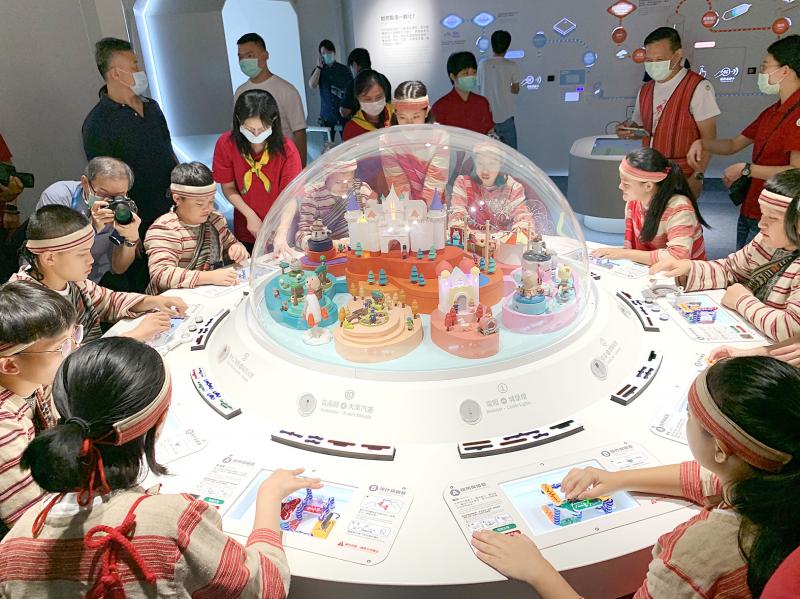Taiwan Semiconductor Manufacturing Co (TSMC, 台積電) yesterday said it is stepping up recruitment this year to cope with rigorous demand, primarily for chips for 5G products and for high-performance computing.
The company, which supplies chips for Apple Inc iPhones, plans to hire 8,000 people this year, TSMC chairman Mark Liu (劉德音) told reporters on the sidelines of a news conference to unveil a revamped semiconductor exhibition at the National Museum of Natural Science in Taichung.
“Our business is exceptionally strong this year. We usually hire about 4,000 new workers a year,” Liu said. “We are scaling up [recruitment] this year.”

Photo: Tsai Shu-yuan, Taipei Times
TSMC last month raised its revenue growth forecast for this year to 20 percent from a year earlier after in April forecasting growth of between 15 percent and 19 percent as 5G and high-performance computing applications spur demand for advanced 5-nanometer and 7-nanometer technology.
The firm last year employed 5,000 people to support growth, bringing its overall headcount to 51,297 as of Dec. 31, a TSMC annual report showed.
TSMC had low turnover last year of 4.9 percent, the report showed.
Liu yesterday dismissed a report last week in the Nikkei Asian Review, which said that more than 100 engineers and experienced managers from TSMC had been poached by Chinese rivals since last year to build their own semiconductor technologies and reduce dependence on foreign supply.
“The report is not true,” Liu said.
The COVID-19 pandemic has prevented people from leaving Taiwan over the past six months, he said.
TSMC yesterday repeated its call for the government to adjust the nation’s higher-education system to cope with rapidly growing demand for semiconductor talent.
Talent demand among local semiconductor firms is outgrowing the number of local university graduates as businesses expand rapidly, Liu said.

SEMICONDUCTORS: The German laser and plasma generator company will expand its local services as its specialized offerings support Taiwan’s semiconductor industries Trumpf SE + Co KG, a global leader in supplying laser technology and plasma generators used in chip production, is expanding its investments in Taiwan in an effort to deeply integrate into the global semiconductor supply chain in the pursuit of growth. The company, headquartered in Ditzingen, Germany, has invested significantly in a newly inaugurated regional technical center for plasma generators in Taoyuan, its latest expansion in Taiwan after being engaged in various industries for more than 25 years. The center, the first of its kind Trumpf built outside Germany, aims to serve customers from Taiwan, Japan, Southeast Asia and South Korea,

Gasoline and diesel prices at domestic fuel stations are to fall NT$0.2 per liter this week, down for a second consecutive week, CPC Corp, Taiwan (台灣中油) and Formosa Petrochemical Corp (台塑石化) announced yesterday. Effective today, gasoline prices at CPC and Formosa stations are to drop to NT$26.4, NT$27.9 and NT$29.9 per liter for 92, 95 and 98-octane unleaded gasoline respectively, the companies said in separate statements. The price of premium diesel is to fall to NT$24.8 per liter at CPC stations and NT$24.6 at Formosa pumps, they said. The price adjustments came even as international crude oil prices rose last week, as traders

Taiwan Semiconductor Manufacturing Co (TSMC, 台積電), which supplies advanced chips to Nvidia Corp and Apple Inc, yesterday reported NT$1.046 trillion (US$33.1 billion) in revenue for last quarter, driven by constantly strong demand for artificial intelligence (AI) chips, falling in the upper end of its forecast. Based on TSMC’s financial guidance, revenue would expand about 22 percent sequentially to the range from US$32.2 billion to US$33.4 billion during the final quarter of 2024, it told investors in October last year. Last year in total, revenue jumped 31.61 percent to NT$3.81 trillion, compared with NT$2.89 trillion generated in the year before, according to

SIZE MATTERS: TSMC started phasing out 8-inch wafer production last year, while Samsung is more aggressively retiring 8-inch capacity, TrendForce said Chipmakers are expected to raise prices of 8-inch wafers by up to 20 percent this year on concern over supply constraints as major contract chipmakers Taiwan Semiconductor Manufacturing Co (TSMC, 台積電) and Samsung Electronics Co gradually retire less advanced wafer capacity, TrendForce Corp (集邦科技) said yesterday. It is the first significant across-the-board price hike since a global semiconductor correction in 2023, the Taipei-based market researcher said in a report. Global 8-inch wafer capacity slid 0.3 percent year-on-year last year, although 8-inch wafer prices still hovered at relatively stable levels throughout the year, TrendForce said. The downward trend is expected to continue this year,